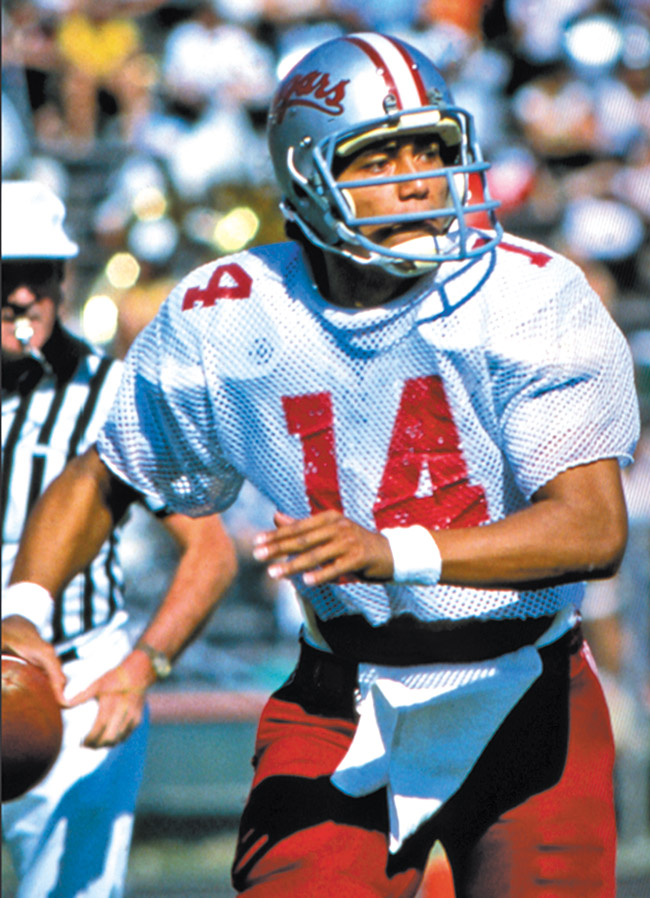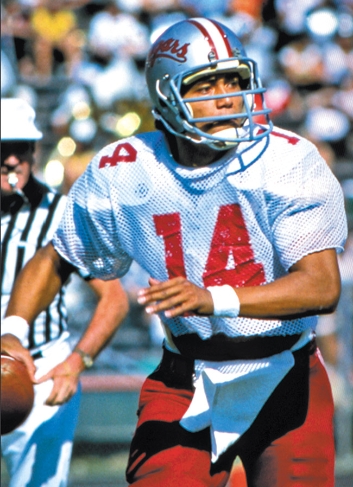A Force In Changing American Football
Pride and determination are often enough to get things done in a hurry. When that doesn’t work, a swift kick in the okole can prove beneficial.
That’s pretty much how the Polynesian Football Hall of Fame got started.
Former 49er Jesse Sapolu and Denver Bronco alumni Ma’a Tanuvasa (both founders and board members) had for years tossed around the idea of creating a place of honor and inspiration for Polynesian athletes. They represent pride and determination. SMU coach and Hall of Fame board member June Jones was the boot.
“June has the personality to look Ma’a and me in the eye and say, ‘Stop talking about it and just do it. I’m tired of hearing you talk about it.’ And he’s right,” Sapolu says with a huge laugh. “You can talk about it for years, but unless you step forward, it’s not going to get done.”
And it’s gotten done – just seven months after the three discussed the issue at Jones’ annual American Samoa Football Academy & Medical Mission.
On Jan. 23 at the Hawaii Convention Center, six players and one coach will be inducted as the inaugural class of the Polynesian Football Hall of Fame.
“For those coming to the ceremony, their jaws are going to drop because it is going to be quite an event,” says former UH coach and selection committee chairman Dick Tomey.
Kurt Gouveia, Olin Kreutz, Kevin Mawae, Junior Seau, Jack Thompson, Herman Wedemeyer and Ken Niumatalolo are not necessarily the best Polynesians to play or impact football, but they do represent the broad spectrum of the individuals the Hall hopes to identify and honor.
Qualification for enshrinement is quite simple: Be Polynesian. It does-n’t matter if one is Hawaiian, Samoan, Tongan or a typical 50th state mix. There is no blood quantum, and address and place of birth are of no concern. Be a brother (Sapolu’s designation for all Polynesians), and you qualify. It helps to be a great athlete, successful coach or influential administrator.
“Kevin Mawae is a great example,” says Sapolu about the Savannah, Ga., born lineman. “He has a Hawaiian last name, but he was a military kid, and he was always looking for ways to connect back to his Hawaiian roots.”
Mawae’s reconnection with his Hawaiian roots highlights the Hall’s secondary purpose: to educate and inspire young Polynesians athletes.
“We should be honoring Polynesia’s greatest football players, coaches and contributors, so that future generations know where it all started from,” says Tanavasa.
“This thing is bigger than all of us,” adds Sapolu. “It’s not about us or one individual; it’s about when our generation is gone that we leave the next generation in better hands than when we came in.”
The selection committee (Tomey, former NFL executive Gil Brandt, former BYU head coach LaVell Edwards, ESPN sports-caster Neil Everett, KITV sports director Robert Kekaula and former Utah head coach Ron McBride) generated a list of 100 players, and 25 coaches and contributors. From there, the long list was whittled down and voted on by the members. The only instructions the committee was given was that the board members were ineligible for the first year.
“I’m glad I am not part of the selection committee because that would be hard to pick someone, and there are a lot of people I don’t know,” said Tanuvasa. “It just makes more sense to let others with more experience do the job.”
That the Polynesian Football Hall of Fame went from concept to completion in less than a year is impressive and it reflects how quickly football has grown in Polynesia, and how its athletes have impacted the sport.
Sapolu has been running football camps in Samoa for more than 25 years and is amazed at the changes he’s seen.
“In the ’80s they used to cut slippers and use them as thigh pads,” he recalls. “We used to have 400 kids at the camp, and if 10 had shoes, that was a good day. At the time, it was impossible for a player who played in Samoa to come to the States, go to college and make it to the NFL. Now, we have seven guys in the NFL who didn’t leave the island until they became college players. Sometimes I laugh when I think how far we have come.”
The PFHOF has modeled itself after the NFL Hall of Fame. Inductees get a jacket, a ring and someday a plaque in a physical museum yet to be determined. Hawaii, Las Vegas, Utah and California are interested in hosting the site. More important, each inductee gets a scholarship in his or her name at his or her alma mater. The education assistance is available to any male or female Polynesian athlete.
The Hall of Fame celebration is open to the public. Tickets cost $250 for individuals, and tables of 10 cost $2,500. The original allotment of 40 tables has been sold out, but extra seating has been added. Sponsorships range from $1,000 to $15,000.
Those not able to make the Jan. 23 event can enjoy a community forum at Polynesian Cultural Center. The free event at the park’s Hale Aloha dinner theater will feature a discussion and a Q&A with inductees and board members.
Former Cardinals, Packers and Eagles running back and kick returner Vai Sikahema is the master of ceremonies.
Induction ceremony tickets can be purchased at polynesianfootballhof.org. For information about the community forum, call Polynesian Cultural Center at 1-800-367-7060.








 Holy Week & Easter in Aiea || Free Events for All at OSHi! ️️
Holy Week & Easter in Aiea || Free Events for All at OSHi! ️️